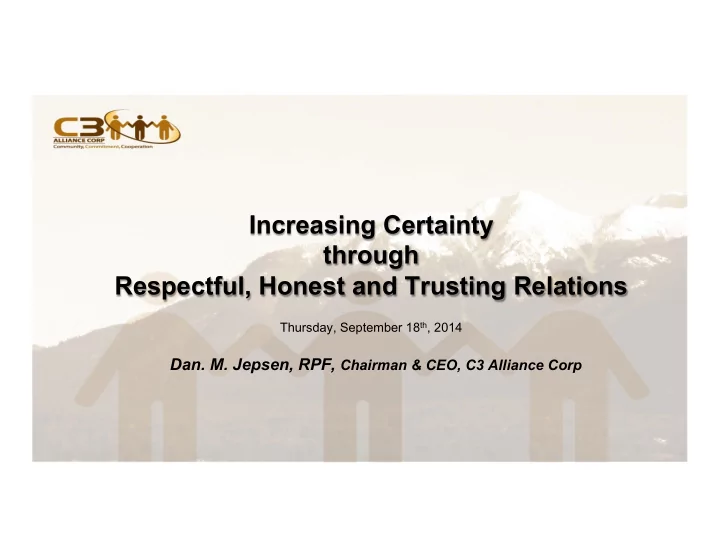

Increasing Certainty through Respectful, Honest and Trusting Relations Thursday, September 18 th , 2014 Dan. M. Jepsen, RPF, Chairman & CEO, C3 Alliance Corp
What Will I Talk About Today? • Why “Positive Relations” are Important? • Aboriginal and Business Cultures • Legal Cases “Set the Stage” • Suggested 10 Principles • How Do You Foster “Positive Relations?” • Consultation Vs. Accommodation
Why Are Positive Relations Important? • Aboriginal People are the most powerful ally • Aboriginal People are the most powerful “deterrent” • Negative relations – Value? • Positive Relations – Value?
First Impressions • Contact Options • Maps, Binders and Forms • Who’s Backyard? • Your Timeline Vs. “Their” timeline • Negative Relations Vs. Positive Relations • Listening Vs. Telling – Big Difference
Aboriginal Values Business Values • Trust and Respect • Trust and Respect • Certainty • Certainty • Benefits • Benefits • Respect for Culture • Positive Company and Heritage Reputation • Protection of the • Protection of the Environment Environment • Sustainability • Sustainability
Calder/Delgamuukw/Haida/Taku Decisions • Recognition of the exclusive use and occupation of the land • Duty to Consult and Accommodate • Key role of Governments • No “Veto” Right?
Litigation • Should be avoided - if at all possible • Never increases certainty and never encourages investor confidence • Painfully slow - First Nations Patience is Amazing! - Share Holder Patience – Not So Much! • Never delivers “absolute clarity” EVER! • Win or lose, your future will be more challenging
Value in Building Positive Relations? • Boosts Aboriginal, government, NGO, regulator and public support • Supports market interest • Provides investor and market confidence and value
How Do You Foster “Positive Relations”? • Common courtesy • Honesty and integrity in all dealings • Open, honest and consistent communications • Good business practices “Credibility and trust are built over the long term and can be lost in a day”
Learn About The Community • Research history of recent projects and interactions • Explore local culture and heritage issues and concerns • Learn about local labour force and businesses
Before Contact • Research Band Governance structure • Be familiar with asserted traditional territories • Be familiar with sensitive environmental and cultural issues • Be familiar with Community priorities
Making Contact • In person • Senior personnel at first meeting • Commit to meet early and often • Your timeline Vs. their timeline • We are requesting access to “their backyard” – Understand this! • Rushing or pushing too hard will lead to further delays and possible unrest
What To Say • Sincere gratitude to be within Traditional Band Territories • Communicate with respect and integrity • Outline company “hopes” • Explain company vision • Discuss possible timelines • Minimize use of technical maps and presentations • Is there opportunity for change? • Listen carefully to questions and provide “clear” answers • Promise less, deliver more
Communicate Regularly • Company plans and status • Possible risks and opportunities • Explain clearly! And simply • Listen carefully • Apprise Bands of all activities and changes of plans • Prepare to share opportunities and benefits
Communication Provides • A better project! A better outcome • Community trust and goodwill • Manages expectations and “rumors” • Balances social, economic and environmental needs • Fosters support and cooperation • Incorporates ideas and solutions to local concerns early in planning • Increases understanding of local culture and heritag e
Launching a Successful Outreach • Orally based intuitive culture • Plan series of “longer” visits and meetings • Leave maps, plans, etc. behind – in your office!
Meeting Delays • There will be delays • Hunting, fishing, family functions always take precedence over business meetings • Key contacts are often extremely busy and dealing with more pressing issues
Company Should • Be consistent in approach • Live up to all commitments • Meet with Elders and other community members • Consider community walk about • Reflect Aboriginal input in plans • Include Traditional Knowledge • Financial support?
Summary “ Business will face challenges if local Aboriginal Peoples do not support the project. Aboriginal communities and developers that work together can develop projects with mutual benefits and certainty .”
Choices… Aboriginal People protesting Aboriginal People supporting and and resisting your plans encouraging your plans
Thank you! C3 Alliance Corp www.c3alliancecorp.ca “ C3 Alliance Corp. is focused on creating mutually beneficial relationships between Indigenous Peoples, businesses and governments based on trust, respect, and a commitment to create benefits and certainty.”
Recommend
More recommend